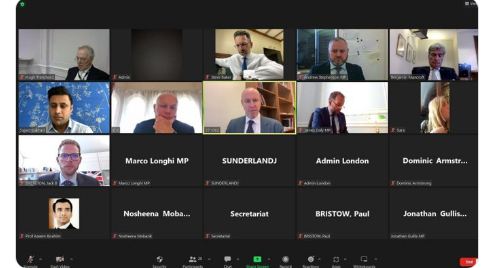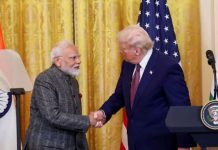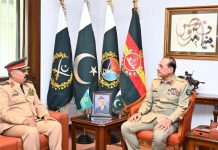LONDON: Conservative Party MPs and peers are angry over being prevented from speaking with PTI chief Imran Khan, whose internet connection was reportedly disconnected for half an hour ahead of a Zoom call he was meant to have with nearly 20 British politicians.
Sara Britcliffe, MP for Hyndburn and Haslingden, tweeted a screenshot of Conservative politicians in a Zoom meeting room with former adviser Zulfi Bukhari, saying that Mr Khan was set to join the call “when, without warning, Pakistan’s telecoms authorities cut off internet connections to his compound”.
She expressed concern about the “deteriorating” economic, political and security situation, and called for the release of political prisoners and journalists in Pakistan.
Azeem Ibrahim, one of the participants of the meeting who also helped arrange the call, told Dawn the MPs were “angry and annoyed” that they were unable to speak to Mr Khan.
PTI USA looks to lobby Senate after lawmakers write to Blinken over ‘suppression of opposition’ in Pakistan
“The initiative was taken by Lord Daniel Hannan who is very thoroughly interested in Pakistan and has met Imran Khan during his visits there,” Mr Ibrahim, research professor at the Strategic Studies Institute, told Dawn.
Lord Hannan of Kingsclere was a Conservative MEP from 1999 to 2020, and is now president of the UK’s Institute for Free Trade.
Zulfi Bukhari helped arrange the call with Mr Khan, and the “the idea was to get members of parliament together to get a briefing directly from Imran Khan about what is happening”.
The participants were unable to speak with Mr Khan as his internet connection was cut, and instead ended up speaking with Mr Bukhari — who informed them that Mr Khan’s internet had been cut around 6pm Pakistan time — and asked him a series of questions.
“The purpose was not to support PTI or Imran Khan but just to understand what’s happening. There is a deep concern among British politicians about the degradation of democracy in Pakistan,” he said, adding that it was not just about Mr Khan but about the “overreach of the military in general”.
He added, “Some of the MPs were very angry and annoyed, and agreed that we should make a statement that British parliamentarians have been prohibited from speaking with Mr Khan, and that this is not acceptable. They all were very upset, as they are very senior with very busy schedules,” he said.
He also pointed out that “many of these MPs have very large Pakistani constituencies”. Mr Ibrahim said in his meetings with other parliamentarians on all sides, he has seen the deep concern about what’s happening in Pakistan “even if they don’t express it publicly”.
“This is not about Imran Khan. Some [MPs] are supporters of Nawaz Sharif or were big fans of Benazir Bhutto. The concern is more about the crisis in Pakistan right now.”
“This is… about how authorities are behaving which is disturbing. It does not serve Pakistan and is hugely damaging in the long run if free and fair elections are not held and journalists continue to be harassed,” Mr Ibrahim said.
Baroness Nosheena Mobarik, another call participant, said she was invited to the call by Lord Dan Hannan to see “different perspectives on what is happening in Pakistan”.
The British government has expressed its support for democracy and elections in Pakistan, but thus far has refrained from making any direct comments on Mr Khan’s arrest and the subsequent crackdown.
Two weeks earlier, UK Prime Minister Rishi Sunak during PMQs was asked to comment on the ongoing crisis in Pakistan. He responded by saying that the UK and Pakistan has a “longstanding close relationship” and that the arrest of Mr Khan is an “internal matter”.
The Pakistan Telecommunication Authority (PTA) did not respond to a request for comment. Authorities in Pakistan regularly curtail access to cellular and data services for security reasons, such as during the recent unrest following May 9, but it was not clear how official machinery could restrict individual internet connections at private residences or compounds, as Mr Khan alleges.
Anwar Iqbal adds from Washington: Over the last 10 days, the PTI team held three meetings with Senator Bob Menendez, who chairs the Senate Committee on Foreign Relations. They also briefed the Senate Sub-committee on South Asia.
In the United States, the PTI is moving its campaign from the House of Representatives to the Senate, which has a greater say in external affairs.
On Thursday, a PTI team met Senator John Cornyn, one of the senior most Republicans in the House, and plans to approach others as well.
Their goal is to persuade the senators to send a letter to Secretary of State Antony Blinken, requesting him to use his influence to “protect democracy in Pakistan” and to persuade Islamabad to hold fair and free elections.
Earlier this month, 69 members of the House sent a similar letter to Mr Blinken, which also sought his help to stop the Pakistani government from “suppressing the opposition,” as a PTI leader Atif Khan said.
The Foreign Office recently rejected the letter, saying it did not agree with the characterisation of the events of May 9 and the situation in Pakistan, as reflected in that missive.
Last month, PTI USA also succeeded in raising the issue on the floor of the House when Congressman Brad Sherman spoke on the current situation in Pakistan. Now they are seeking a full debate in both the House and the Senate.

















